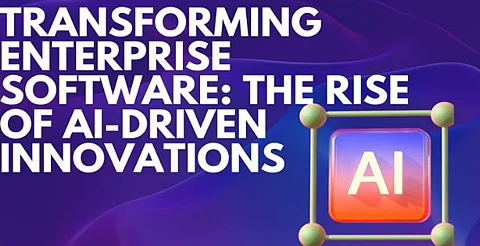

Artificial intelligence is revolutionizing enterprise software, enhancing automation, decision-making, and operational efficiency across industries. In his latest research, Balakrishna Sudhabathula explores the impact of AI on enterprise systems, highlighting key technological advancements that are shaping the future of business applications. This article delves into the innovations driving intelligent automation, decision support, and AI-powered solutions.
Today, an enterprise AI system is a complex architectural entity designed to house and enable the effective use of massive amounts of organizational data. And to that end, the various layers-the data ingestion, processing, analytics, integration, and presentation-have been seen to be put in place. The incorporation of machine learning algorithms such as transformer-based and deep-learning neural networks towards the actual operations of HR analytics and financial risk assessment has brought tremendous success in achieving automation of these areas. Container orchestration is bringing scale and high availability to put a solid and adaptable foundation under AI-enabled solutions.
These enterprise federated systems have added capabilities to ensure the systems integrate in a federated fashion-in other words, consider that federated learning approach whereby data privacy is retained while insight is gained across organizational frontiers. Real-time decision-making occurs closer to data sources or entry points, thus cutting down on system latency and bandwidth consumption. Advanced explainability frameworks help address regulatory compliance issues and build trust with stakeholders by demystifying AI-driven decisions. Integration with existing enterprise resource planning systems ensures that seamless workflows are created across departments to enable maximum operational efficiency.
AI-assisted decision support systems revolutionized business analytics today. Utilizing predictive models, this system efficiently assesses risks, detect fraud, and optimize financial forecasting. Real-time data streaming with API-first design principles has made organizations capacity to handle enormous datasets dynamically and improve the accuracy of decisions. Event-driven architecture will make a timely and informed decision, leaving companies continually evolving data landscapes.
Now, advanced natural language processing capabilities can allow decision-makers to make queries through a conversational interface instead of via a standard search approach. Multi-modal systems now deliver visual, textual, and numerical information simultaneously, thus providing a comprehensive overview of the situation for strategic planning. Mechanisms for scoring confidence demonstrate the probability of reliability in predictions, making high-level executives understand how they will weigh AI suggestions against human judgment.
Now organizations stress-test their strategies, using the scenario simulation tools before implementation, thus helping in lowering cost mistakes and arriving at the best path forward. Their emergence has enabled an entirely new spectrum of decision environments: collaborative environments in which distributed teams summon the benefits of collective intelligence, underscored by augmented intelligence, to create a powerful syntactic synthesis of human creativity and machine precision that drives innovation and competitive advantage.
Enterprise chatbots are modern-day conversational agents with skills such as NLU and contextual awareness from Al. They are an asset to businesses for customer service, work towards scalable internal communication., and provide the promise of 24/7 support. With recent advancements in dialogue management systems in sync with machine learning algorithms for accuracy, it is shaping up to be an expected addition for businesses to boost their customer experience and operational efficiencies.
The latest models have emotion-detection abilities to analyze the sentiments of customers and adjust responses as required, thereby embedding empathy into the interactions. Successful models have AI capabilities to retain high levels of dialog throughout the requisite hand-off process where the conversation, once caught in a loop, goes from an AI to a human worker and passes back to the AI when the situation recedes. On the flip side, knowledge graph integration easily allows them to query multiple enterprise silos leveraging varying data to provide unified responses instead of siloed, one-dimensional answers. With their multilingual capability, the global reach has been lifted, tearing down global language barriers to drive international business operations. Voice-based interfaces are a tool of accessibility at its best ever, ensuring hands-free performance in any enterprise-kind scenario. Personalization engines help these devices track users' preferences and interaction history and personalize their responses based on users' needs and communication behaviors. This subsequently enhances system adoption and satisfaction at an enterprise level.
Despite its transformative potential, AI adoption in enterprise software presents challenges related to data privacy, scalability, and model maintenance. Organizations are investing in AI trust, risk, and security management to address these concerns. Automated pipelines, model monitoring, and compliance frameworks are being implemented to ensure AI-driven decisions remain reliable, transparent, and secure. The adoption of MLOps practices further enhances AI model performance, enabling continuous optimization.
The next phase of AI evolution in enterprise software lies in the integration of Automated Machine Learning (AutoML) and Explainable AI. AutoML streamlines model development, allowing businesses to deploy AI solutions faster and more efficiently. Meanwhile, Explainable AI ensures transparency by making AI-driven decisions interpretable and accountable. These advancements will be crucial in industries that require stringent compliance, such as finance and healthcare.
In conclusion,Balakrishna Sudhabathula’s research highlights the significant strides AI has made in enterprise software, from intelligent automation to advanced decision support systems. As AI technologies continue to evolve, businesses must balance automation with explainability, ensuring seamless integration while maintaining ethical and regulatory standards. The future of AI in enterprise applications promises increased efficiency, smarter decision-making, and transformative business solutions.
